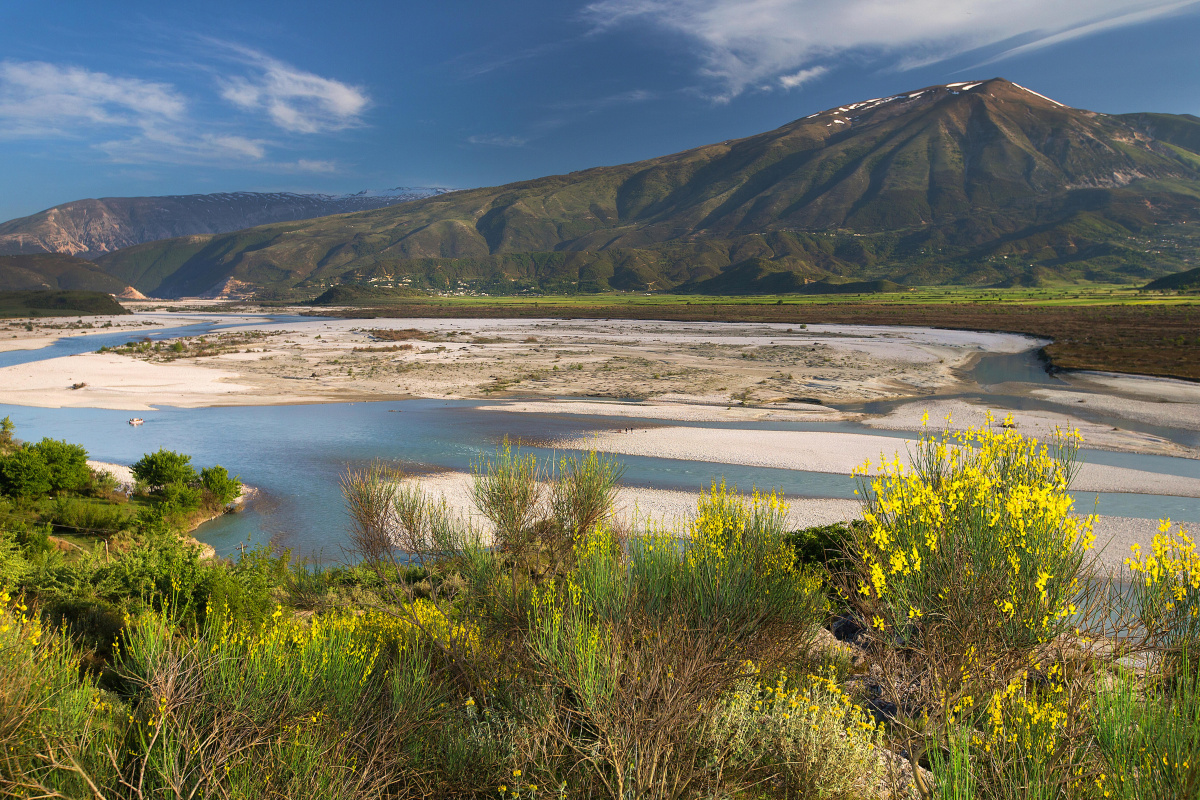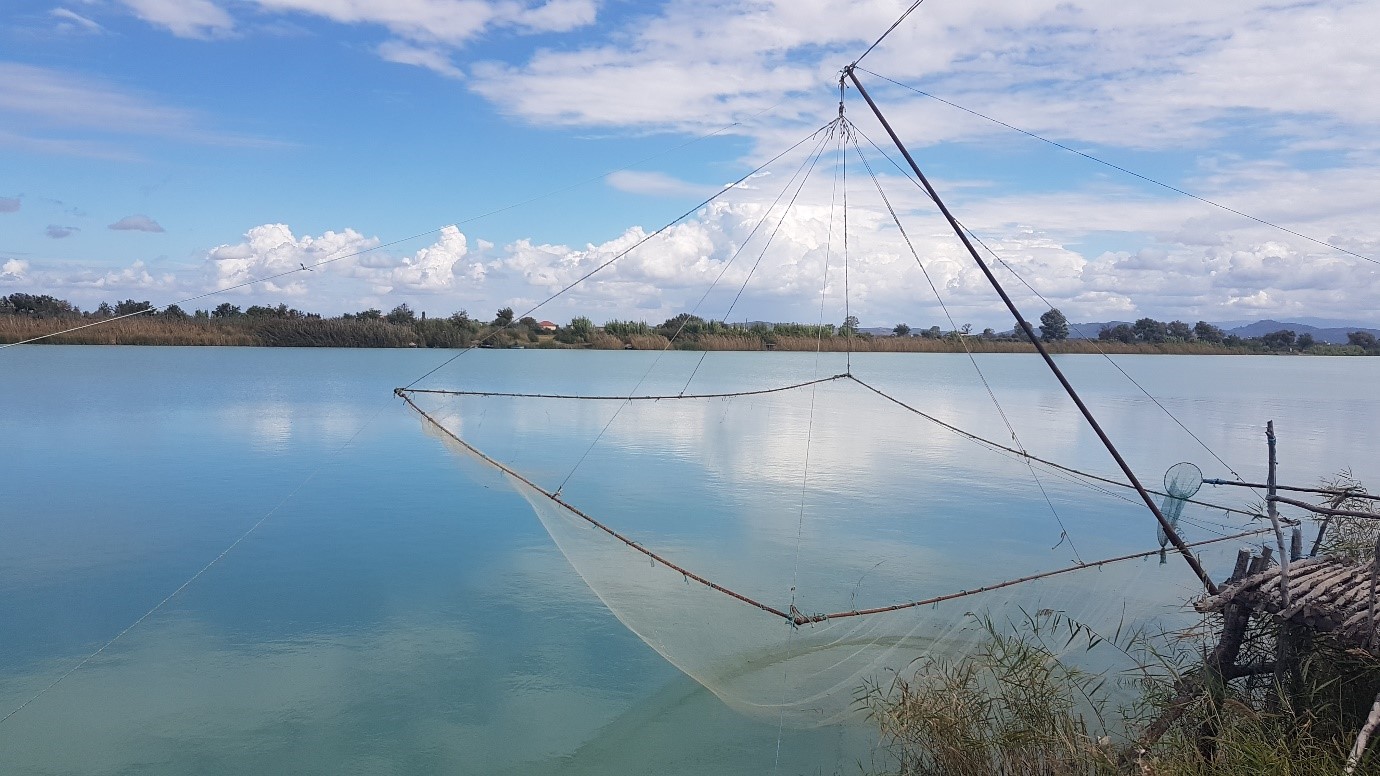Vjosa, one of our last wild rivers, becomes Europe's first Wild River National Park
Today, the Vjosa River in Albania, one of the last wild rivers of Europe is declared a National Park by the Albanian Government, becoming the first Wild River National Park in Europe. In future, the Vjosa will be conserved as a living, free-flowing river, to the benefit of people and nature. This is the result of a unique collaboration between the Albanian Government, local and international experts, environmental NGOs from the Save the Blue Heart of Europe campaign, IUCN (International Union for Conservation of Nature), and outdoor clothing company Patagonia.
The Vjosa and its main tributaries run freely for over 400km, from the Pindus Mountain Range in Greece, where it is called Aoös, to the Adriatic coast in Albania. The river and its surrounding areas are ecosystems of substantial biodiversity and are home to over 1,100 species of animals, including 13 animal species and two plant species assessed as globally threatened by IUCN.
The Vjosa Wild River National Park facilitates solutions to challenges faced by the river such as water and land pollution, waste management, and deforestation. Additionally, the National Park will create economic opportunities for local communities, through responsible tourism, and help address the problem of depopulation from the area.
Gaining IUCN Category II: National Park status means the Vjosa will be afforded protection, to the highest international standards, ensuring its ecological integrity, allowing natural processes to occur, and sustaining populations of all native species. The designation will take place in two phases, with Phase I being declared today (15 March 2023):
- In Phase I, the active channel of the river will be given National Park status, plus some lands and river vegetation within the active channel, or at risk of flooding or erosion – over 400km in total length. The area will be managed as a National Park and is expected to be fully operational by early 2024.
- Phase II, in the coming years, will add other free-flowing tributaries and areas that are integral to the river’s ecosystem, plus some private land, following consultation with stakeholders.
Patagonia, IUCN, and the Save the Blue Heart of Europe campaign NGOs have been engaged in the work to protect the wild rivers of the Balkan Peninsular for the last eight years. In 2021, IUCN finalised a study showing how applying IUCN’s protected area standards would benefit the communities and biodiversity of the Vjosa Valley.
In June 2022, Albanian Prime Minister Edi Rama, Minister of Tourism and Environment Mirela Kumbaro and Patagonia CEO Ryan Gellert came together at a ceremony in Tirana to sign a commitment to create Vjosa Wild River National Park together. Over the last nine months, extensive fieldwork and in-depth analysis has taken place by a team of over 30 local and international experts in areas such as eco-tourism, geomorphology, ecology, planning and management of protected areas, sustainable financing of national parks, legislation, and social and environmental impact assessment. Consultation with interest groups, as well as public communication, has also been incorporated into the process. At the same time, the Albanian government is starting a joint process with the Greek government to create the Aoös -Vjosa transboundary park, aiming for the highest level of protection for the entire river, from source to sea, across both countries.
Mirela Kumbaro Furxhi, Minister of Tourism and Environment, Albania:
Ryan Gellert, CEO, Patagonia:
Boris Erg, Director, European Regional Office, IUCN:
NOTES TO EDITORS
About the Vjosa River in Albania
The Vjosa River in Albania is one of the last big, wild rivers in Europe, outside of Russia. The river and its tributaries flow freely from the mountains in Greece to the Adriatic coast in Albania. This wilderness area is made up of an enormous mosaic of different habitat types, from the narrow gorges in the upper part, to the wide braided river sections in the middle part, to the near-natural delta at the Adriatic Sea. The middle stretch alone is made up of at least eight habitat types that have the highest conservation importance, at EU level.
The surrounding watershed provides the villages with fertile land for agricultural activities such as crop production and livestock farming. The abundance and diversity of fish is vital for the well-being of local fishermen, mostly in the lower part of the Vjosa. Eco-tourism on the Vjosa and its tributaries is ever-increasing, particularly in recent years as enthusiasts have started to enjoy activities such as rafting, canoeing, kayaking, and swimming.
About the Ministry of Tourism and Environment
The Ministry of Tourism and Environment is the government department responsible for drafting and implementing policies aimed at environmental protection, climate change protection, sustainable use of natural resources, protection of nature and biodiversity, sustainable development of forests and pastures, water quality monitoring, as well as the design and implementation of tourism policies. The Ministry of Tourism and Environment operates under the relevant legislation, concerning nature and biodiversity, including flora and fauna, soil protection from erosion and degradation, protection of the natural landscape, protection of wild fauna and endangered species, and protected areas.
In September 2021, Mirela Kumbaro Furxhi was appointed Minister of Tourism and Environment, the first woman in Albania to hold a position as Minister of Tourism and Environment.
About IUCN
IUCN (International Union for Conservation of Nature) is a membership Union composed of both government and civil society organisations. It harnesses the experience, resources and reach of its more than 1,400 Member organisations and the input of more than 15,000 experts. IUCN is the global authority on the status of the natural world and the measures needed to safeguard it.
About IUCN Red List of Threatened Species™
The IUCN Red List of Threatened Species™ is the world’s most comprehensive information source on the global extinction risk status of animal, fungus and plant species. Open to all, it is used by governmental bodies, non-profit organisations, businesses and individuals.
About Patagonia
We’re in business to save our home planet.
Founded by Yvon Chouinard in 1973, Patagonia is an outdoor apparel company based in Ventura, California. As a certified B Corporation and a founding member of 1% for the Planet, the company is recognized internationally for its product quality and environmental activism, as well as its contributions of nearly $200 million to environmental organizations. Its unique ownership structure reflects that Earth is its only shareholder: Profits not reinvested back into the business are paid as dividends to protect the planet.



